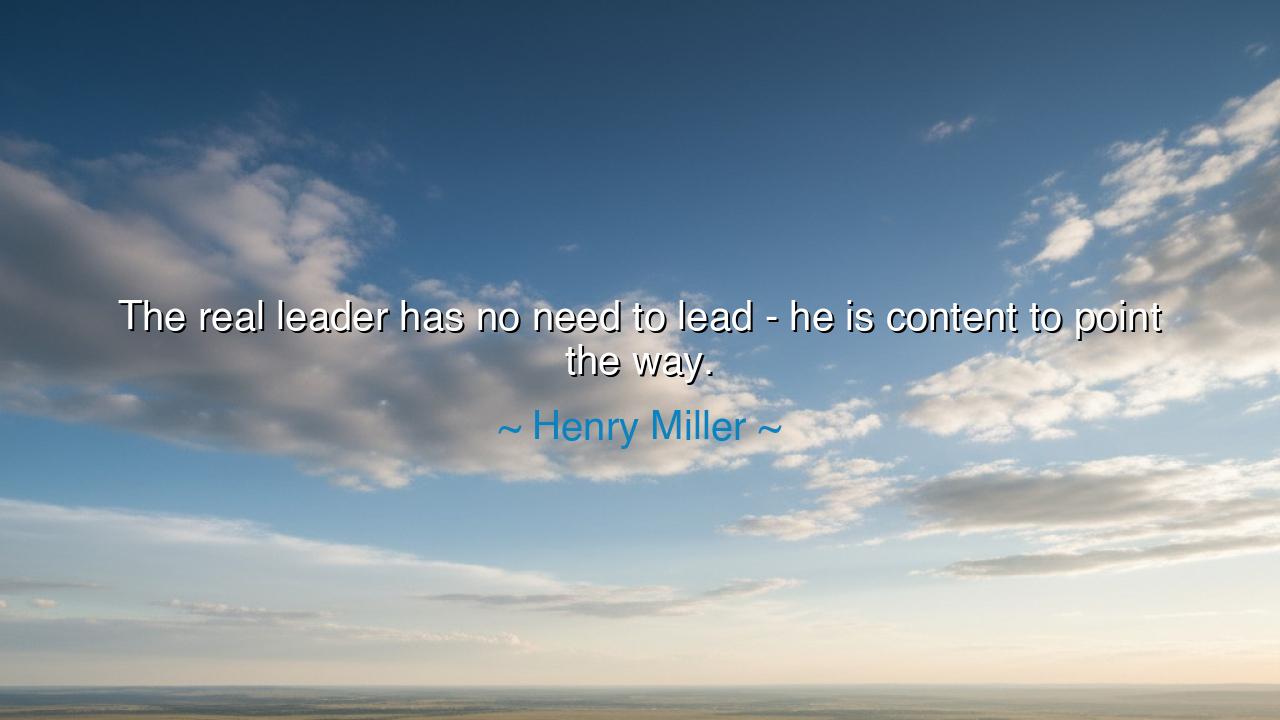
The real leader has no need to lead - he is content to point the






Hear, O seekers of truth and travelers upon the path of purpose, the words of Henry Miller, the writer of daring spirit and unyielding thought: “The real leader has no need to lead — he is content to point the way.” In this saying lies a truth that stands beyond kingdoms and centuries — that leadership is not about domination, but illumination; not about command, but conviction. The greatest leader does not stand before his people as a master, but walks among them as a guide. He does not cry, “Follow me,” but lives in such a way that others say, “This is the way.”
Henry Miller, though known for his bold and unconventional writings, was a philosopher of life as much as of art. He believed that true greatness is born not from control, but from example — that to truly lead, one must first become what others aspire to be. His words speak against the hunger for power that blinds so many: the desire to rule, to be seen, to be obeyed. The real leader, he reminds us, is beyond such vanity. He does not seek followers, for he knows that the purpose of leadership is not to create dependence, but to awaken independence in others. He is content not to pull others forward by force, but to point the way — to light the path so that all may walk it freely.
The ancients, too, revered this wisdom. Lao Tzu, the sage of the Tao, taught that “When the best leader’s work is done, the people will say, ‘We did it ourselves.’” The true leader does not shout, but whispers truth into the hearts of others. His greatness is invisible, his presence felt only through the growth of those around him. Like the river that nourishes the valley without boasting of its power, he allows others to flourish. He trusts the natural flow of wisdom within each soul, guiding gently, never forcing. Such leadership requires strength greater than pride — the strength of patience, humility, and faith in the human spirit.
Consider the life of Mahatma Gandhi, who led one of the greatest movements in human history without throne or army, without weapon or wealth. He did not command millions — he inspired them. He simply pointed the way: toward peace, toward justice, toward truth. His words were gentle, yet they shook empires. His steps were small, yet they moved nations. Gandhi’s power was not in control, but in example. He showed that when a man stands firmly for what is right, others will find the courage to stand beside him. This is what Miller meant — that the real leader is not the one who demands obedience, but the one who awakens purpose in others.
To point the way is to trust that others can walk it. The false leader hoards authority, fearing the loss of power. But the true one gives it freely, knowing that the growth of others is his greatest victory. He measures success not by how many obey him, but by how many rise because of him. The wise leader builds not followers, but more leaders. His mission is not to be indispensable, but to make himself unnecessary — for the torch he carries is meant to be passed, not clutched in fear.
And yet, this kind of leadership requires great inner discipline. It is easy to command; it is hard to trust. It is easy to speak loudly; it is harder to live quietly in truth. To point the way demands humility — the kind that finds joy in others’ success and peace in silence. Such a leader is like the lighthouse on a stormy shore: it does not move, it does not shout, it simply shines. And in its stillness, countless ships find their way home.
O listeners, take this wisdom into your hearts: strive not to be followed, but to be worth following. Do not seek to lead for glory, but to serve for good. Let your example speak louder than your words, and your integrity guide more surely than your command. If you must point the way, point it toward truth, compassion, and courage. Then even when you are gone, the path will remain bright for those who come after.
So remember the wisdom of Henry Miller: the real leader is not the one who stands above others, but the one who walks ahead just far enough to show the path. Be such a one. Lead not by power, but by presence; not by pride, but by purpose. For in the end, the greatest mark of a leader is not how many follow him, but how many have learned to walk beside him — free, capable, and inspired by the light he once shone upon their way.






AAdministratorAdministrator
Welcome, honored guests. Please leave a comment, we will respond soon